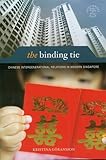The Binding Tie : Chinese Intergenerational Relations in Modern Singapore / Kristina Göransson.
Material type: TextSeries: Southeast Asia: Politics, Meaning, and Memory ; 46Publisher: Honolulu : University of Hawaii Press, [2009]Copyright date: ©2009Description: 1 online resource (224 p.) : 8 b&w images, 1 map, 1 chartContent type:
TextSeries: Southeast Asia: Politics, Meaning, and Memory ; 46Publisher: Honolulu : University of Hawaii Press, [2009]Copyright date: ©2009Description: 1 online resource (224 p.) : 8 b&w images, 1 map, 1 chartContent type: - 9780824832599
- 9780824864620
- 305.8
- online - DeGruyter
- Issued also in print.
| Item type | Current library | Call number | URL | Status | Notes | Barcode | |
|---|---|---|---|---|---|---|---|
 eBook
eBook
|
Biblioteca "Angelicum" Pont. Univ. S.Tommaso d'Aquino Nuvola online | online - DeGruyter (Browse shelf(Opens below)) | Online access | Not for loan (Accesso limitato) | Accesso per gli utenti autorizzati / Access for authorized users | (dgr)9780824864620 |
Browsing Biblioteca "Angelicum" Pont. Univ. S.Tommaso d'Aquino shelves, Shelving location: Nuvola online Close shelf browser (Hides shelf browser)

|

|

|

|

|

|

|
||
| online - DeGruyter The Architecture of Life and Death in Borneo / | online - DeGruyter The Attractive Empire : Transnational Film Culture in Imperial Japan / | online - DeGruyter The Best Course Available : A Personal Account of the Secret U.S.-Japan Okinawa Reversion Negotiations / | online - DeGruyter The Binding Tie : Chinese Intergenerational Relations in Modern Singapore / | online - DeGruyter The Chinese Classic of Family Reverence : A Philosophical Translation of the Xiaojing / | online - DeGruyter The Clan Records : Five Stories of Korea / | online - DeGruyter The Culture of Sex in Ancient China / |
Frontmatter -- Contents -- Acknowledgments -- Abbreviations -- Prologue -- Introduction -- 1. From Temasek to the Republic of Singapore -- 2. Fieldwork in the Metropolis -- 3. Modernity and the Generation Gap -- 4. Binding Ties -- 5. Renegotiating the Intergenerational Contract -- Conclusion -- Notes -- Glossary -- References -- Index -- about the author -- OTHER VOLUMES IN THE SERIES
restricted access online access with authorization star
http://purl.org/coar/access_right/c_16ec
Since gaining independence in 1965, Singapore has become the most trade-intensive economy in the world and the richest country in Southeast Asia. This transformation has been accompanied by the emergence of a deep generational divide. More complex than simple disparities of education or changes in income and consumption patterns, this growing gulf encompasses language, religion, and social memory. The Binding Tie explores how expectations and obligations between generations are being challenged, reworked, and reaffirmed in the face of far-reaching societal change. The family remains a pivotal feature of Singaporean society and the primary unit of support. The author focuses on the middle generation, caught between elderly parents who grew up speaking dialect and their own children who speak English and Mandarin. In analyzing the forces that bind these generations together, she deploys the idea of an intergenerational "contract," which serves as a metaphor for customary obligations and expectations. She convincingly examines the many different levels at which the contract operates within Singaporean families and offers striking examples of the meaningful ways in which intergenerational support and transactions are performed, resisted, and renegotiated. Her rich material, drawn from ethnographic fieldwork among middle-class Chinese, provides insights into the complex interplay of fragmenting and integrating forces.The Binding Tie makes a critical contribution to the study of intergenerational relations in modern, rapidly changing societies and conveys a vivid and nuanced picture of the challenges Singaporean families face in today's hypermodern world. It will be of interest to researchers and students in a range of fields, including anthropology, sociology, Asian studies, demography, development studies, and family studies.
Issued also in print.
Mode of access: Internet via World Wide Web.
In English.
Description based on online resource; title from PDF title page (publisher's Web site, viewed 02. Mrz 2022)


